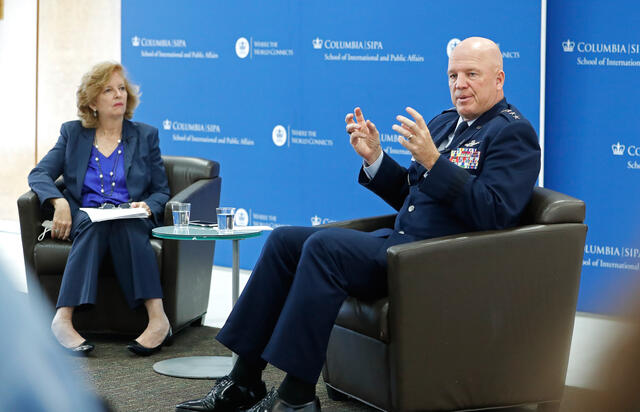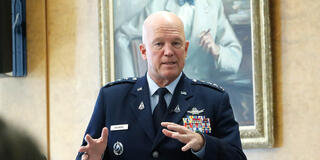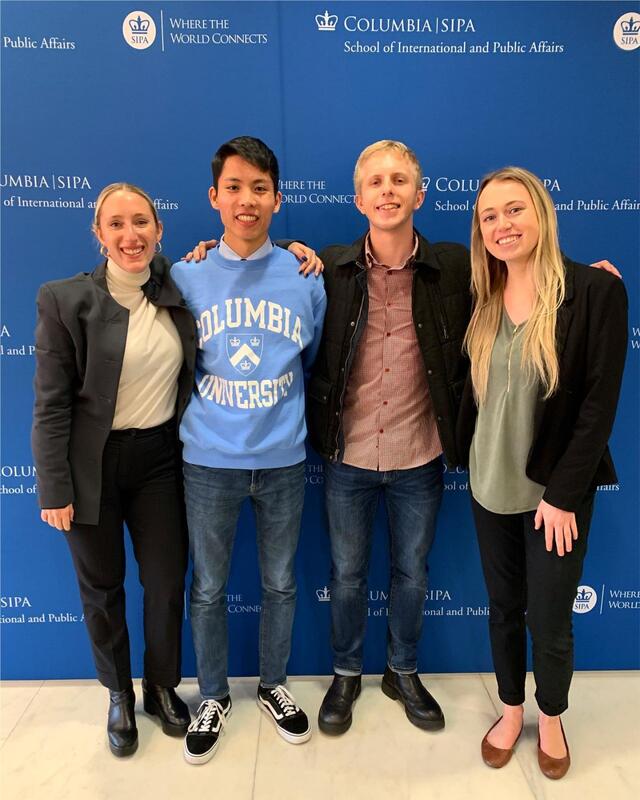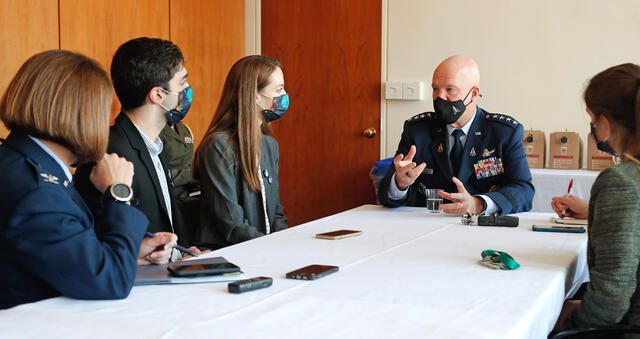
Taking Cyber to the Stars


General John W. Raymond, chief of space operations for the United States Space Force, highlighted operational challenges for America’s newest military branch and discussed pressing challenges the nation will face in space when he gave a live keynote address to kick off this year’s NY Cyber 9/12 Strategy Challenge.
The November 4 speech before an audience of students and faculty was one of the largest gatherings held at SIPA since March 2020, as Columbia University slowly welcomes external visitors back to campus, circumstances and public health permitting.
The cyber competition itself was conducted online for the second consecutive year, drawing more than 120 students worldwide to a two-day event that took place on November 4 and 5. Participants were charged with developing policy responses to a cascading cyber crisis — albeit a hypothetical one — that unfolded through a series of fictitious intelligence reports.
This year’s competition, the sixth to be held in New York, was made unique by the scenario’s intentional focus on space in addition to cyber, an intersection that is likely to gain importance as both domains become increasingly militarized.
Set in the summer of 2022, the competition scenario took cyber to the stars by examining the question of what cyber conflict targeting space infrastructure might look like in the near future. Escalatory, nation-state-backed cyber attacks on private and military space assets were powered by zero-day exploits — flaws in computer systems that are known to attackers, but not to defenders — sold on the black market. The imagined situation was further complicated by maritime tensions in the South China Sea as well as diplomatic challenges between the United States and China.

As the competition progressed the threat of war loomed, inspiring student teams to draw on their policy knowledge to devise creative responses to de-escalate the situation. Competitors used deductive and analytical reasoning to make sense of intelligence reports, which featured everything from social media posts and 911 call transcripts, to diplomatic cables and top-secret intelligence memos. Extensive meetings and feedback from current space experts in the field helped shape the scenario to be as realistic as possible for students to grapple with.
The 32 teams of student groups, which represented universities based in the UK, Malawi, and Turkey, in addition to the United States —presented their proposed responses to panels of judges representing government agencies, the private sector, academia, and the Space Force.
“While the competition only lasts two days, preparing an event of that scale takes months of preparation,” said Annabelle Larose MPA ’22, president of SIPA’s Digital and Cyber Group (DCG), the student organization that organized and conducted the competition.
“It was really important to our board to create a realistic scenario while offering participants access to subject-matter experts,” Larose continued. “We felt that space would stand out and appeal to a broad set of students from diverse academic backgrounds in engineering and law in addition to public policy. Late-night prep sessions quickly became the norm, but nothing could beat the feeling of seeing such a large number of teams from all over the globe enthusiastically take part in this 48-hour competition our board created from scratch. It was a unique and humbling experience and I am really proud of our team.”
Indeed, the NY Cyber 9/12 Strategy Challenge is the only competition of its kind primarily run by students. SIPA's Tech and Policy Initiative sponsors the event in partnership with the Atlantic Council’s Cyber Statecraft Initiative.
Atlantic Council board director Franklin D. Kramer welcomed competitors, emphasizing the importance of diversity and mentorship in creating the next generation of cybersecurity leaders. Virtual panels through the two -days provided participants with additional insight into careers in cybersecurity, the emergent dynamics of cyber conflict, and the future of space in the context of security policy.
In the keynote address, General Raymond cited the value of simulation-style exercises and encouraged SIPA students to consider the opportunities of policy work in space.

“You could have a whole career — a very fruitful career — just working in space policy,” Raymond told DCG’s Cyber 9/12 organizers in a separate interview. “As the domain has shifted from a peaceful, benign domain to a warfighting domain, all the things we know how to do on air, land, and sea —and under the sea, if you will —we’re developing all of that for space, and so there are huge policy discussions going on as we speak.”
A live discussion among Raymond, Dean Merit E. Janow, and students followed the keynote address.
As for the competition, a team of students representing SIPA and Columbia Engineering triumphed. Second- and third-place teams came from NYU (the Center for Global Affairs at the School of Professional Studies) and Columbia (again, SIPA and Engineering) respectively.
The winners were distinguished by their work across disciplines, which came in handy when finalists had to respond to challenging technical and geopolitical questions after having just fifteen minutes to prepare. (Like most competing teams, winners adopted whimsical names such as Red Pill Brokers, #NoClickFix, and F1REF0X.)
A key takeaway from the competition is the reckoning that space conflict will likely play a major role in international politics for decades to come. As future policymakers with a vested interest in representing SIPA’s values of advancing solutions to critical global issues, DCG student leaders are convinced that if — or, as some experts say, when — cyber conflict does move to space, the students who competed in this year’s NY Cyber 9/12 Strategy Challenge will be well positioned to face those challenges of tomorrow.
This account was prepared by Sabrina Otness MPA ’22 and Eli Clemens MIA ’22, student co-directors of this year’s NYC Cyber 9/12 Strategy Challenge.